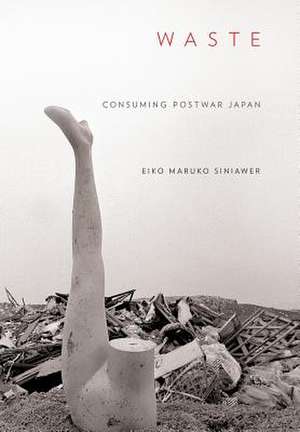Waste – Consuming Postwar Japan
Autor Eiko Maruko Siniaweren Limba Engleză Hardback – 14 oct 2018
Over the course of the long postwar, Japanese society understood waste variously as backward and retrogressive, an impediment to progress, a pervasive outgrowth of mass consumption, incontrovertible proof of societal excess, the embodiment of resources squandered, and a hazard to the environment. Siniawer also shows how an encouragement of waste consciousness served as a civilizing and modernizing imperative, a moral good, an instrument for advancement, a path to self-satisfaction, an environmental commitment, an expression of identity, and more. From the late 1950s onward, a defining element of Japan's postwar experience emerged: the tension between the desire for the privileges of middle-class lifestyles made possible by affluence and dissatisfaction with the logics, costs, and consequences of that very prosperity. This tension complicated the persistent search for what might be called well-being, a good life, or a life well lived. Waste is an elegant history of how people lived--how they made sense of, gave meaning to, and found value in the acts of the everyday.
| Toate formatele și edițiile | Preț | Express |
|---|---|---|
| Paperback (1) | 233.29 lei 3-5 săpt. | +26.48 lei 7-13 zile |
| MB – Cornell University Press – 14 dec 2024 | 233.29 lei 3-5 săpt. | +26.48 lei 7-13 zile |
| Hardback (1) | 727.53 lei 6-8 săpt. | |
| MB – Cornell University Press – 14 oct 2018 | 727.53 lei 6-8 săpt. |
Preț: 727.53 lei
Preț vechi: 996.62 lei
-27% Nou
Puncte Express: 1091
Preț estimativ în valută:
139.21€ • 145.65$ • 115.64£
139.21€ • 145.65$ • 115.64£
Carte tipărită la comandă
Livrare economică 02-16 aprilie
Preluare comenzi: 021 569.72.76
Specificații
ISBN-13: 9781501725845
ISBN-10: 150172584X
Pagini: 414
Ilustrații: 18 Halftones, black and white
Dimensiuni: 168 x 234 x 35 mm
Greutate: 0.76 kg
Editura: MB – Cornell University Press
ISBN-10: 150172584X
Pagini: 414
Ilustrații: 18 Halftones, black and white
Dimensiuni: 168 x 234 x 35 mm
Greutate: 0.76 kg
Editura: MB – Cornell University Press
Descriere
In Waste, Eiko Maruko Siniawer innovatively explores the many ways in which the Japanese have thought about waste-in terms of time, stuff, money, possessions, and resources-from the immediate aftermath of World War II to the present. She shows how questions about waste were deeply embedded in the decisions of everyday life, reflecting the...
